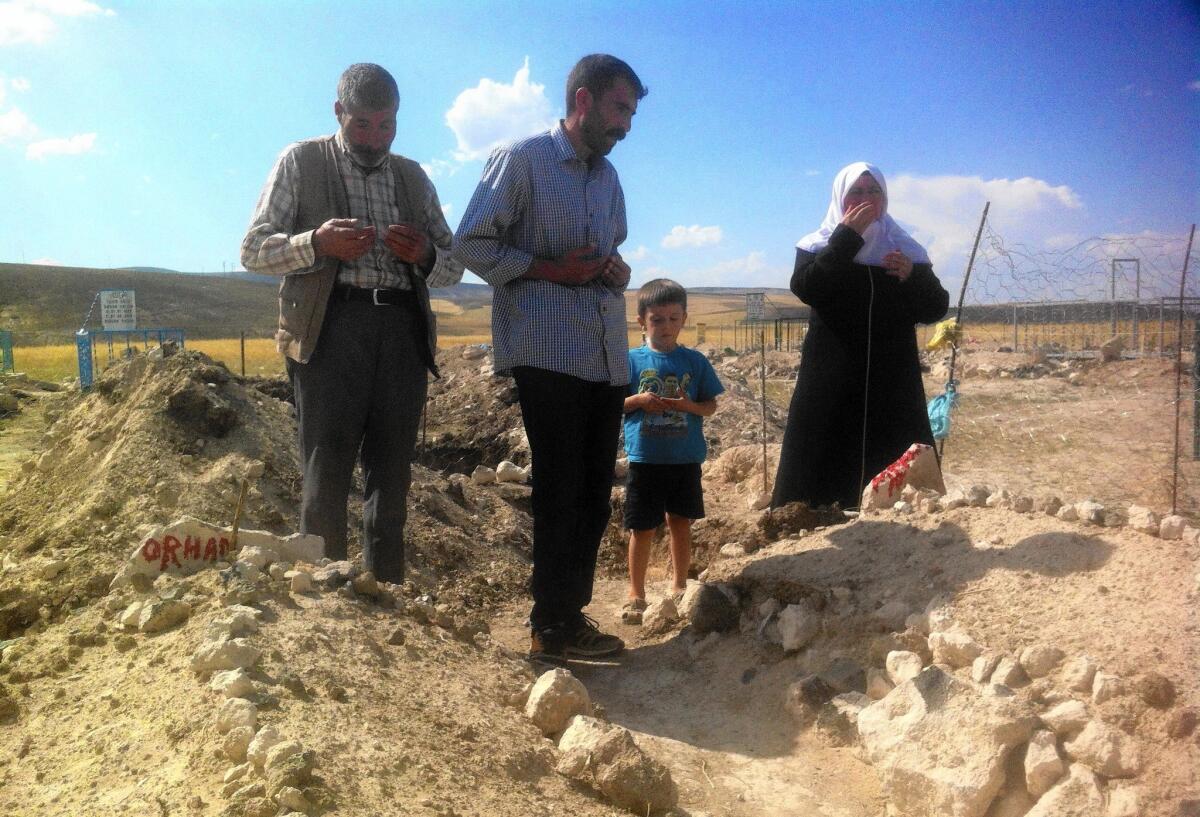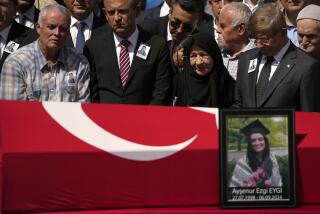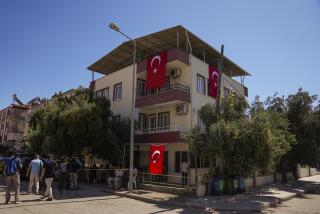In Turkey’s restive southeast, slayings of 2 Kurdish teens raise questions

Relatives visit the graves of two Kurdish boys slain in August by Turkish security forces. Authorities accuse Muhammet Aydemir, 15, and Orhan Arslan, 17, of being Kurdish guerrillas. Their families say the pair were innocents slain in cold blood.
- Share via
reporting from Diyadin, Turkey — Muhammet Aydemir’s loved ones last saw him alive one night in mid-August.
The 15-year-old came bursting through the door of the family home, carrying pastries from the bakery where he swept floors and carted wood to the oven. It was a summer job, providing a little bit of cash for a bright young student during the searing months.
His family says Muhammet would wake up before dawn and work until the sun sank over the parched prairie lands flanking this barren city in Turkey’s easternmost expanses.
Best of all, the job meant that Muhammet could spend the days with his close friend, Orhan Arslan, 17, who also worked at the bakery. The pair regularly slept out back, in a small room crammed with bunk beds.
That last evening, his family recalled, Muhammet had purchased a pair of new socks for an older brother, Yunus, and given his mother cash to buy gifts for her younger children.
A few hours later, Muhammet and Orhan would be lying dead in pools of blood at a bakery storage shed, fatally shot by Turkish troops. Authorities called the two teens armed Kurdish terrorists. Relatives say the Kurdish boys were innocents executed in cold blood.
::
In Turkey, three years of peace talks aimed at ending a bloody Kurdish insurgency have collapsed. The tit-for-tat violence now convulsing the nation is some of the worst in two decades. Wide swaths of Turkey’s southeast, the Kurdish homeland, have become a war zone.
About 150 security personnel have been killed in the last two months, as fighters with the Kurdistan Workers’ Party, or PKK, a leftist group seeking greater rights for Turkey’s Kurdish minority, detonate roadside bombs and launch brazen raids on military and police posts.
Turkish authorities have responded with airstrikes and police raids, killing hundreds of Kurdish extremists in militant sanctuaries in the southeastern mountains and in northern Iraq, the government says.
Authorities regularly seal off cities and towns with large Kurdish populations, imposing strict curfews and seeking to keep journalists and human rights monitors from observing what goes on behind police lines.
Human rights and pro-Kurd activists have alleged a number of abuses: mass arrests; women killed by police snipers; civilians barred from hospitals; and forests and farmland set ablaze by Turkish security forces. The government of President Recep Tayyip Erdogan dismisses such charges as propaganda.
::
The Aydemir family home is a simple place, its cream-colored walls adorned with Koranic scripture and images of Sahmeran, a serpentine figure from Kurdish folklore.
Chickens squawk near where Muhammet’s wood cart sits, no longer used.
Acquaintances and relatives recall a skinny, unassuming teen, religiously observant and hardworking — and a devoted fan of Istanbul’s Galatasaray soccer team.
“He was very polite,” says Recep Birgul, who owns the bakery, and, like others, referred to the slain youth as Memis, a diminutive.
Muhammet aspired to be a religious studies teacher, his mother says. But he also liked rap music.
Most days, Muhammet and Orhan would take time to feed Orhan’s pigeons. Muhammet wanted to save up a portion of his daily 25-lira (about $8) salary to buy some pigeons of his own, his family says.
Opportunity is scant in a place such as Diyadin; seasonal work and day labor provide limited employment. But Muhammet’s father injured his back years ago and providing for his six children was a struggle.
On the evening of Aug. 12, residents say, there was a buildup of police special forces in Diyadin. That night, Muhammet’s mother says, she implored her son to stay home.
“He said he wanted to go to the bakery to sleep,” she recalls. “He said it was safe there.”
Muhammet left home about 8 p.m. for the bakery, his family says. Half an hour or so later, Kurdish guerrillas attacked a military police station in Diyadin, hammering it with rocket-propelled grenades and rifle fire. Media reported one militant killed but no police casualties.
Security camera images from that evening aired on CNN Turk show three teenage boys, among them Muhammet and Orhan, sitting outside the bakery. Something startles them and they make a break for it. One boy sprints down a side street, while Muhammet and Orhan run straight ahead. Relatives say that is the moment when the two teenagers dashed for shelter in the bakery storage area. Muhammet’s father, Mehmet Hanifi Aydemir, says he called his son on his cellphone and urged him to lie low.
“I told him: ‘Lie down, stay where you are and do not go out,’” the father recalls. “‘The police will kill anyone they see.’”
Fevzi Kahraman, a shepherd, returned home about 9 p.m., putting his sheep into the barn behind his residence, his family says. Police vehicles rumbled through the streets.
“I went to the balcony to see what was happening,” says the shepherd’s wife, Nihal.
Advancing were teams of heavily armed special forces officers, balaclavas covering their faces, witnesses say. They were calling for Kahraman by name, and eventually arrested him. The police accused him of harboring PKK fighters, his family says, an allegation he denies.
According to his wife, Kahraman was held for an hour face down on the street outside the family home, along with other detainees, and beaten with rifle butts, resulting in three broken ribs.
“And then we heard the gunshots,” Nihal says. “Crazy shooting.”
Witnesses and Kurdish groups say Turkish police unleashed a wave of automatic weapons fire on the bakery storage room, which is on the ground floor of the shepherd’s home. The bullet-riddled bodies of Muhammet and Orhan were found inside.
Video recorded by a Kurdish human rights group in the aftermath shows blood smeared on shattered glass and on scraps of paper. Yellowed bone fragments cling to spiderwebs dangling from the walls.
The governor of the district charged that the two teenagers killed were in possession of a pistol and were members of the PKK’s youth wing.
The boys’ families say the two were unarmed and executed at close range.
“They are trying to hide what they did,” Muhammet’s distraught father says, accusing Turkish authorities of a coverup. “Muhammet’s face was unrecognizable.”
On Diyadin’s western fringe, yellow grass reaches up knee high. Wind sweeps in from the plains. The Aydemir family proceeds along the narrow dirt track winding through the rudimentary cemetery.
Sevgul Aydemir, Muhammet’s mother, is whispering Koranic verse. Standing silent is Orhan’s father, Sukru Arslan, a broad-shouldered man lost to sorrow.
Two graves, the soil mounded up high and adorned with stones, lie side by side. The rock headstones, hand-painted in blood red, read: Orhan, Memis.
Johnson is a special correspondent. Times staff writer Patrick J. McDonnell in Beirut contributed to this report.
More to Read
Sign up for Essential California
The most important California stories and recommendations in your inbox every morning.
You may occasionally receive promotional content from the Los Angeles Times.










